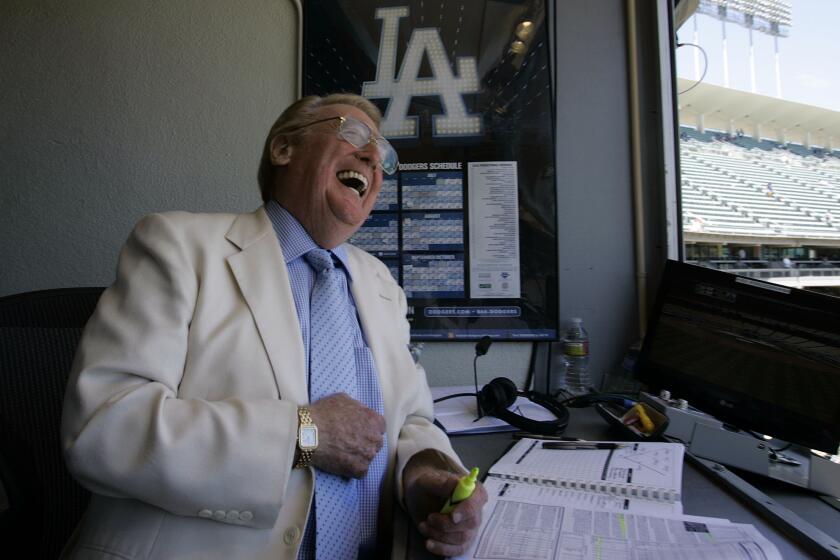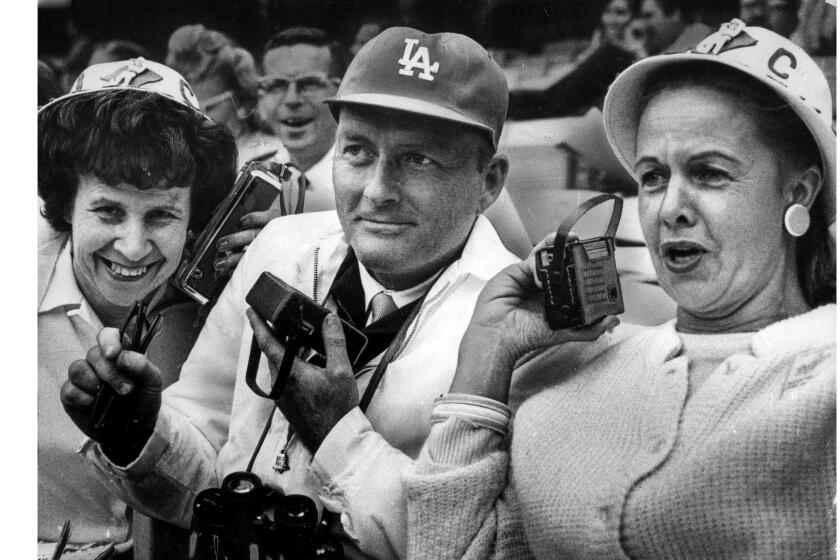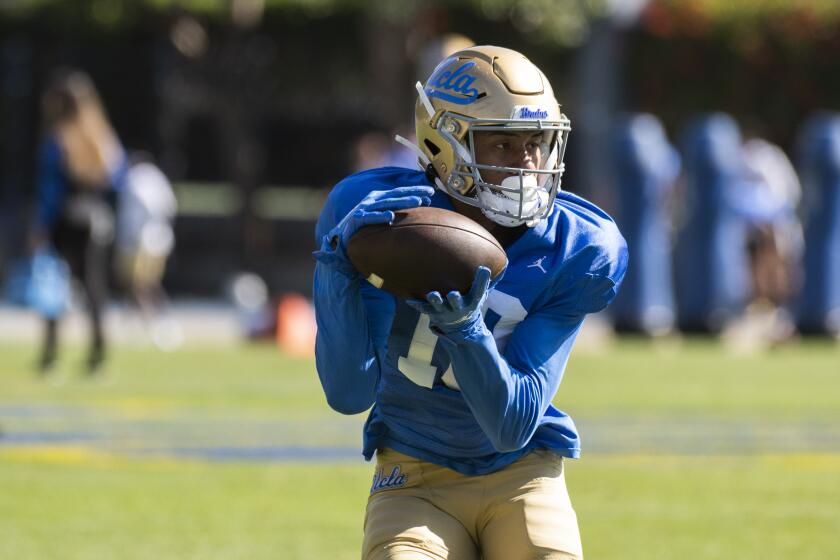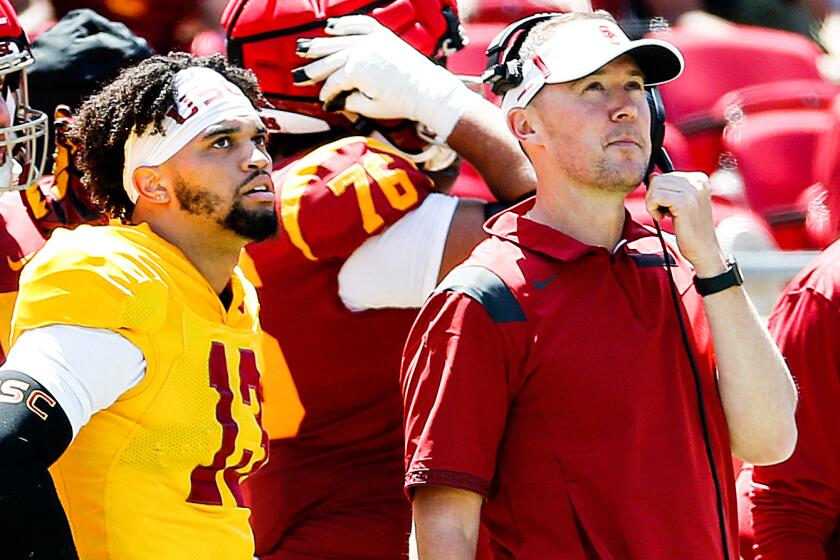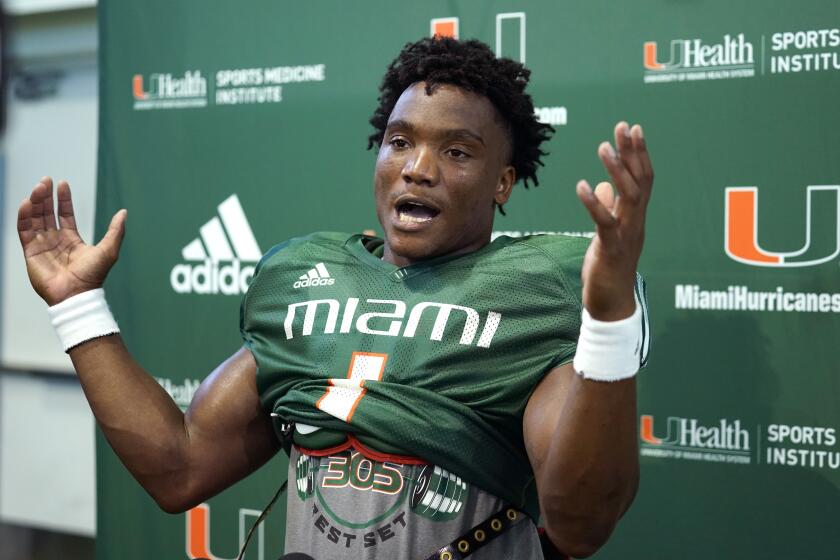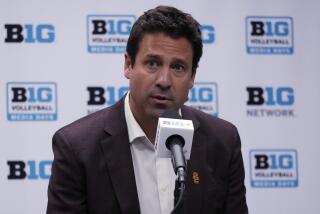Commentary: What are Vin Scully and John Wooden discussing in heaven? UCLA’s move to the Big Ten?
This is how it might have gone a few weeks ago, when Vin Scully got to heaven and sought out some of his old friends. Among those would be John Wooden. They had put in their time. Wooden died in 2010, four months shy of his 100th birthday; Scully died Aug. 2, three months shy of his 95th.
They would have lots to talk about.
Vin: “John, you look wonderful. Not a day over 70.”
John: “You, too, Vin. I was telling some of my friends up here that you would be coming by soon. I told them they’d hear the voice before they saw the person.”
Vin: “Just wasn’t any more time for Dodgers baseball, I guess.”
Legendary Dodgers announcer Vin Scully died Tuesday at age 94. Here’s some of what our staff has written about him now and throughout his celebrated life.
John: “Get me up to date with what’s going on down there. I haven’t kept up. Things are busy up here. You’d get a kick out of this. I think I told you several times that my favorite sport was always baseball. So, I get here and before I know it, Mother Teresa is after me to manage her softball team. It’s in the Division I Pearly Gates League. How could I say no to her? I told her I probably wasn’t suited for the job because I would never be able to curse like Tommy Lasorda. She tested me right away, asking me what I thought of Kingman’s performance. I did say, ‘Darn.’ I took the job. Turns out she is a five-tool player — hits for average, hits with power, runs fast, has a golden glove and a rocket arm.”
Vin: “Once I get settled, maybe I could do a game or two. How about this — ‘It’s time for heavenly softball.’ ”
John: “Perfect. For everybody here, that would be like a gift from … well, you know. Our stadium isn’t huge, only seats about a hundred-million. But three times as many have transistor radios. And some guy from ESPN ran a cable feed to Purgatory.”
For decades, listening to Vin Scully on a transistor radio became part of the quintessential experience for any fan attending a game at Dodger Stadium.
Vin: “You wanted me to get you up to date on things down there. I have some surprising things to tell you.”
John: “They fixed the freeways?”
Vin, chuckling: “Nope. More to do with sports. Colleges now have something called a transfer portal. It’s really a big deal. It was created, they say, to make transferring less cumbersome, with less paperwork. Everything is done with computers now, and at first, it sounded like a reasonable way to help out busy college administrators. But it seemed to open the door wide to college kids who weren’t happy with their coaches or their playing time, or maybe just the size of their alum’s monthly check. So, they’d enter this portal. It is kind of like putting yourself on a store shelf so coaches can walk by with shopping carts and pluck you off.”
John: “Whew … sounds like you are talking free-agent college sports. Are they all trying to hire Scott Boras? There were always unhappy kids and transfers. Are there more now because of this, and, I assume, they still have to sit out a year?”
The size of each of Chip Kelly’s high school recruiting classes at UCLA has dropped from 27 in 2018 to six at this point for 2023. But the number of transfers has soared.
Vin: “Yes, lots more. And no, they get a one-time transfer without having to lose a year.”
John: “Holy sweat socks. There have to be good reasons for allowing a transfer, right?”
Vin: “Well, yes. There are some. Health and injury and family things are listed. But the most interesting one says that a transfer waiver can be granted ‘with the assertion of no participation opportunity at their previous school.’ ’’
John: “Well, that’s a decent reason. If a player sees no chance of getting to play, he or she ought to have the right to play elsewhere.”
Vin: “There seems to be lots of loose interpretation of that. A school you know well just acquired a new quarterback through the transfer portal, and he had been the star quarterback at his previous school, even an All-American candidate. So, it is quite likely he would have had plenty of opportunity to participate there.”
USC coach Lincoln Riley says he’s “taken the reins off” Caleb Williams, and the quarterback wants to prove he can be “Coach Riley Part 2 on the field.”
John: “I have no words. Except, maybe, ‘Fight On.’ ”
Vin: “There’s more. A couple of years ago, well after you were gone, the NCAA finally had to cave and now student-athletes have the right to make money by endorsing products and marketing themselves. It is called NIL (Name, Image and Likeness).”
John: “You mean while they are playing college sports, they can be like self-marketing agents and personal billboards?”
Vin: “That’s one way to put it.”
John: “We are mostly talking a couple of hundred dollars for the star players, right?”
As name, image and likeness compensation rules hit the one-year mark, The Times provides a Q&A covering what has happened and what’s likely to come.
Vin: “Some reports are projecting six- or even seven-figure payouts to lots of players.”
John: “I need to sit down. My heart was pretty strong when I was living, but I’m not sure now. I appreciate you getting me up to date, Vin, but I am just plain stunned. I hope that’s all you’ve got.”
Vin: “Just one more thing. Starting next season, your UCLA Bruins will play in the Big Ten Conference.”
John (doubling over in laughter): “Vin, you are the best. What a sense of humor. You got me. You had me all the way until the Big Ten thing. The other stuff might be possible. But UCLA in the Big Ten! Come on. … Let’s go find Mother Teresa and get you started on the lineups. You devil, you.”
More to Read
Go beyond the scoreboard
Get the latest on L.A.'s teams in the daily Sports Report newsletter.
You may occasionally receive promotional content from the Los Angeles Times.
